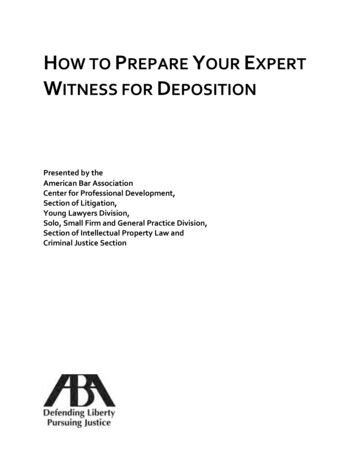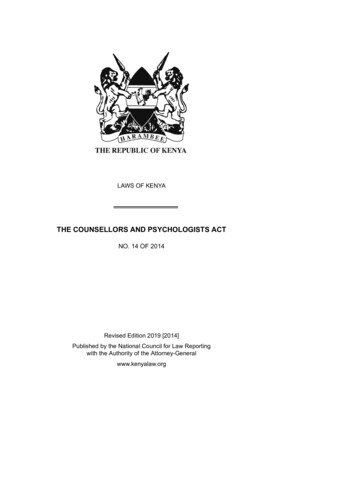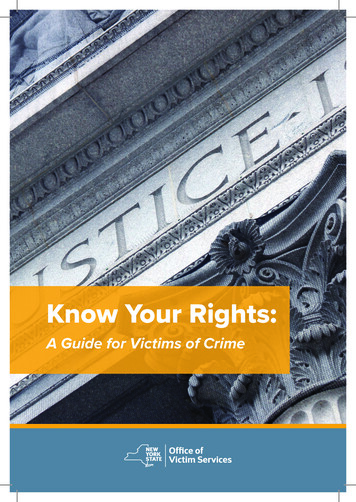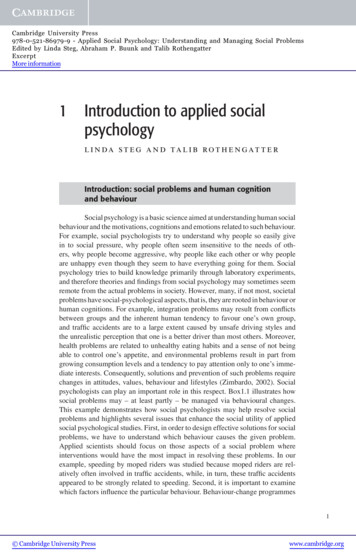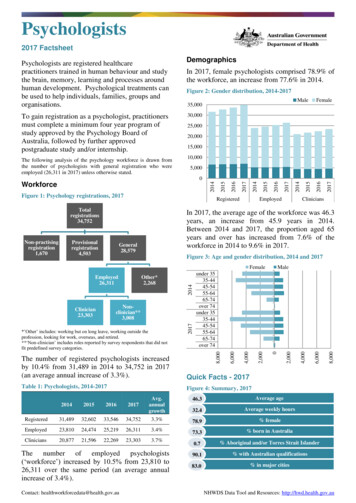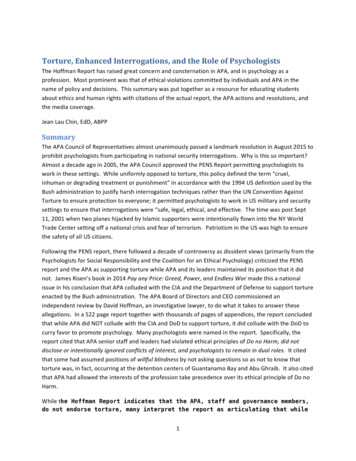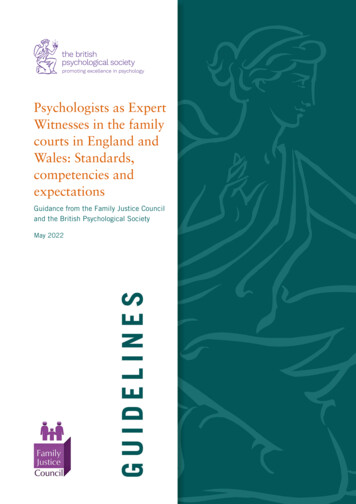
Transcription
Psychologists as ExpertWitnesses in the familycourts in England andWales: Standards,competencies andexpectationsGuidance from the Family Justice Counciland the British Psychological SocietyGUIDELINESMay 2022
2022 The British Psychological SocietyISBN: 978-1-85433-813-6All rights reserved. No part of this publication may be reproduced ortransmitted in any form or by any means, electronic or mechanical,including photocopy, recording or any information storage retrievalsystem, without permission in writing from the publisher.
Acknowledgements41. Introduction52. Role of psychologists as expert witnesses in family proceedings63. Regulation84. Codes of conduct105. Issues in relation to competences126. Supervision/peer review157. Quality of service168. References18Appendix 1 – Protected titles and regulation of practitioner psychologists19Appendix 2 – Typical training and expertise of practitioner psychologists21a. Clinical psychologists21b. Educational psychologists22c. Counselling psychologists23d. Forensic psychologists25e. Clinical neuropsychologists26f. Health psychologists26g. Sport and exercise psychologists27h. Occupational psychologists28Appendix 3 – Supervision30Appendix 4 – Example of case instructions and appropriate time ranges32Appendix 5 – Checklist for instructing solicitors35PSYCHOLOGISTS AS E XPERT WITNESSES IN THE FAMILY COURTSContents3Psychologists as Expert Witnesses in the family courts in England and Wales I Standards, competencies and expectations I May 2022
PSYCHOLOGISTS AS E XPERT WITNESSES IN THE FAMILY COURTSAcknowledgementsThis updated guidance was written by a joint BPS and Family Justice Council Working Groupreviewing the joint guidance published in 2016. We would like to thank all members of thecurrent and previous Working Group and all those who assisted in the conception of and draftingof the earlier version of the document, as well as those who provided constructive and valuablefeedback during the consultation phase. We acknowledge the positive contributions from theSociety’s Member Networks and the Expert Witness Advisory Group.We are also grateful to The Right Honourable Sir Andrew McFarlane, President of the FamilyDivision of the High Court and Chair of the Family Justice Council, the President’s Offce and thesecretariat of the FJC for their support throughout the process.The Members of the 2022 Working Group were:Dr Jaime Craig (Co-Chair, Family Justice Council) – HCPC Registered Clinical PsychologistChartered Psychologist, Family Psychology Services Ltd.Professor Leam Craig (Co-Chair, British Psychological Society) – HCPC Registered Clinical &Forensic Psychologist, Chartered Psychologist, Forensic Psychology Practice Ltd, University ofBirmingham, Birmingham City University, University of Lincoln.Dr Michael Hymans – HCPC Registered Educational Psychologist Chartered Psychologist, M HPsychological Services Ltd.Dr Sue Whitcombe – HCPC Registered Counselling Psychologist Chartered Psychologist,Independent Practice.Roger Hutchinson – HCPC Registered Clinical Psychologist, Chartered Psychologist, ForensicPsychology Practice Ltd.Maud Davis – Solicitor (Family Justice Council).Sam Momtaz QC – Barrister (Family Justice Council).Hannah Farndon – Practice Team Manager, British Psychological Society.2016 MEMBERSLiz Gillett (Co-Chair, Family Justice Council); Jaime Craig (Co-Chair, British Psychological Society);Alison Russell QC (Barrister, FJC); HH Judge Katharine Marshall (Designated Family Judge, FJC);Heather Payne (Paediatrician, FJC); Sue Candy (Clinical Psychologist, FJC); Michael Hymans(Educational Psychologist, Division of Educational and Child Psychology, BPS); Diane Hammersley(Counselling Psychologist, Division of Counselling Psychology BPS); Miriam Silver (ClinicalPsychologist, Faculty for Children and Young People, Division of Clinical Psychology, BPS); PaulCousins (Clinical Forensic Psychologist, FJC); Sarah J. Brown (Forensic Psychologist, Division ofForensic Psychology, BPS); Sarah Krahenbuhl (Academic, Division of Academics, Teachers andResearchers, BPS); Lisa Morrison Coulthard (Advisor, BPS).4Psychologists as Expert Witnesses in the family courts in England and Wales I Standards, competencies and expectations I May 2022
1.1The agreed minimum standard for all stakeholders, including psychologists and thosein the legal profession, to be guided by, and adhered to, whenever instructing expertwitnesses in family proceedings is set out in Practice Direction 25(b)1.1.2This guidance is a companion document to these generic expert witness standards byfocusing on psychologists and has been prepared jointly by the Family Justice Council(FJC) and the British Psychological Society (BPS). The guidance provides informationto all stakeholders regarding the use of psychologists as expert witnesses and providesdiscipline specifc information in relation to regulation, codes of conduct, competencies,supervision/peer review and quality of service. There is also generic guidance forpsychologist expert witnesses from the British Psychological Society (BPS)2.1.3It should be noted that throughout this document the use of the term ‘psychologist’relates exclusively to practitioner psychologists working within the remit of Health andCare Professions Council (HCPC) or academic psychologists chartered by the BritishPsychological Society (BPS). For guidance on expert witnesses who are not psychologists,please refer to MOJ standards.1.4This guidance is written within the legal context of England and Wales. However, it isacknowledged that it may have some beneft to those working in other jurisdictions subjectto compliance with local practice directions and procedural matters.PSYCHOLOGISTS AS E XPERT WITNESSES IN THE FAMILY COURTS1. Introduction5Psychologists as Expert Witnesses in the family courts in England and Wales I Standards, competencies and expectations I May 2022
PSYCHOLOGISTS AS E XPERT WITNESSES IN THE FAMILY COURTS2. Role of psychologists as expertwitnesses in family proceedings2.1As set out in Psychologists as Expert Witnesses: Best Practice Guidelines for Psychologists(BPS, 2021):‘An expert is a person who, through specialist training, study, or experience, is able toprovide a court, tribunal, or hearing with relevant scientifc, technical, or professionalinformation or opinion, based on skills, expertise, or knowledge, that is likely to be beyondthe experience and knowledge of the representing lawyers, judge, jury or panel.3’Psychologist experts may be instructed in the family courts only where ‘necessary’ toresolve a case justly. Changes in the way the court can instruct experts were refectedin the Family Procedure Rules introduced on 31 January 2013 and later enshrined inlegislation with the Children and Families Act that came into force in April 2014.2.2Psychologists offer expertise in considering the individual and collective psychologicalprofles of different family members, and their impact on key issues and decisions fordetermination by the Court, in public or private family court proceedings.2.3Psychologists assist by undertaking comprehensive assessments that may includedevelopmental, psychological, social, relational and neuropsychological issues in complexsituations through the application of psychological formulation4. This is a highly skilledprocess combining scientifc principles with refective practice to describe the fndingsof the assessment(s). The application of a broad range of psychological theories andprinciples to specifc contexts provides a theoretical framework for valid analysis andprediction. Psychological formulation allows for the evaluation of strengths, weaknesses,capacity for change and evidence-based interventions. It should be noted that whilst thefocus is on formulation some psychologists also use diagnosis alongside formulation andmany can also comment upon diagnostic issues in line with their competence shouldthis arise.2.4Information from varied sources over time and multiple contexts contribute to the essentialprocess of triangulation, the validation and verifcation of data gathered at assessment.This helps to overcome bias and weaknesses of individual methods/theoretical models ofassessment, and increases the credibility and validity of the analysis and psychologicalformulation.2.5Completion of psychological assessment generally involves direct assessment and contactwith the individual and one or more members of the family. Indirect assessment (relyingon documentation and other sources such as video evidence) may be appropriate.2.6Techniques for establishing a psychological opinion appropriate to the instruction andthe individual/family being assessed will vary between psychologists, who may havedifferences in theoretical orientation and approach. Psychologists usually include in theirassessments some combination of standardised psychometric tests, in-depth interviewing,observation of behaviour and interactions and review of other professional records (suchas social care, education, medical and forensic records) in relation to family members,carers, and signifcant others.6Psychologists as Expert Witnesses in the family courts in England and Wales I Standards, competencies and expectations I May 2022
A psychologist’s evidence may be necessary to evaluate single or multiple issues including:mental health; behavioural and emotional functioning; intellectual functioning; mentalcapacity; neuropsychological functioning (e.g. memory, attention, executive functioning);personality assessment; forensic risk assessment; substance misuse and/addiction;learning needs; psychological impact of disability, sensory impairment or ill health;psychological impact of trauma and/or abuse; domestic abuse (e.g. violence and coercivecontrolling behaviours); neuro-developmental conditions (e.g. Autism Spectrum Disorder);attachment styles and interpersonal relationships; capacity for change; and personal,developmental and therapeutic needs. In addition, these features may all be infuencedby socioeconomic deprivation; child arrangement disputes between separated parents;disputed immigration/asylum status; social isolation; child protection; homelessness;criminality; and varied cultural, religious and ethnic backgrounds.2.8Family Court cases may require psychologists to evaluate parents/carers’ functionalcapacities to meet all of the needs of their child(ren) throughout the period of beingyounger than the legal age of adulthood. Public and private family proceedings tend tohave differing perspectives, but practitioner psychologists are often required to commentupon an individual’s capacity for change within the child’s timeframe.2.9Skill areas offered by psychologists also include assessments of mental capacity andmental competence which may include instruction by the Court of Protection. Adultmental capacity assessments may relate to the capacities to engage in the legal process,to give evidence or to give consent in matters such as adoption, sexual contact, fnancialmatters or living arrangements. For children this could include their competence to engagedirectly in the legal process, to give evidence or their competence to directly instruct theirsolicitor without their guardian.PSYCHOLOGISTS AS E XPERT WITNESSES IN THE FAMILY COURTS2.77Psychologists as Expert Witnesses in the family courts in England and Wales I Standards, competencies and expectations I May 2022
PSYCHOLOGISTS AS E XPERT WITNESSES IN THE FAMILY COURTS3. Regulation3.1Statutory regulation for psychology in the UK was introduced in 2009 and the Healthand Care Professions Council (HCPC) is the regulator of practitioner, or registered,psychologists. Practitioner psychologists who have the qualifcations necessary to meet thestringent criteria for statutory regulation with the HCPC, are registered with the HCPC withone (or more) ‘protected’ titles. The legislation protects seven titles: Clinical Psychologist,Health Psychologist, Counselling Psychologist, Educational Psychologist, OccupationalPsychologist, Sport and Exercise Psychologist, and Forensic Psychologist. In addition, thetwo generic titles – Practitioner Psychologist and Registered Psychologist – are availableto registrants who already hold one of the seven ‘specialist’ titles. See Appendix 1 fora detailed description of protected titles.3.2These titles are protected by law. Anyone who uses a protected title must be registeredwith the HCPC. Article 39(1) of the Health Professions Order 2001 makes it a criminaloffence for a person, with intent to deceive, to state that they are on the HCPC Register;to use a designated title to which they are not entitled; or to say falsely that they havequalifcations as a practitioner psychologist. An unregistered person may be committing anoffence even if they do not use the designated title directly, such as describing the servicethey provide as ‘clinical psychology’ or ‘forensic psychology’.To assist the family court in making appropriate instructions all statutorily registeredpractitioner psychologists should use their protected specialist title as it appears on theHCPC register.3.3The title ‘Chartered Psychologist’ can only be used by psychologists who have achievedChartered membership status with the BPS who will appear on the List of CharteredMembers. There are various routes to Chartered Membership currently includingpostgraduate training, research and teaching (see Appendix 1) and it is anticipated thatthese routes will be widened to take into account competencies as well as qualifcations.It is a voluntary scheme and the BPS does not have a regulatory function but those whoare Chartered members of the BPS must comply with BPS codes of conduct and memberconduct rules.3.4Some practitioner psychologists are both statutorily registered with the HCPC andChartered with the BPS. However, the terms ‘Chartered Psychologist’ and ‘RegisteredPsychologist’ are not equivalent. Psychologists registered with the HCPC and/or Charteredwith the BPS both fall within recognised professional codes of conduct and ethicalframeworks. The only psychologists subject to statutory regulation in the UK are thoseregistered with the HCPC.3.5A lack of understanding and awareness has resulted in the use of various titles in theFamily Court system. Such titles have no specifc meaning, nor are they protected orregulated by the HCPC. Examples of such titles include ‘psychologist’, ‘child psychologist’,‘consultant psychologist’, ‘assessment psychologist’, ‘developmental psychologist’ and‘attachment psychologist’. The HCPC does not protect these titles and their use does notindicate statutory registration. Chartered members of the BPS may use descriptive titles toindicate an area of expertise or specialism but these and their areas of specialism on theDirectory of Chartered Members are self-determined and not verifed by the BPS.8Psychologists as Expert Witnesses in the family courts in England and Wales I Standards, competencies and expectations I May 2022
It is not possible to verify how a psychologist has achieved Chartered membership statusfrom the information available on the BPS List of Chartered Members. It is importanttherefore to assist the court by ensuring that a psychologist’s qualifcations/training,experience and specifc areas of knowledge are set out clearly in their CV.It is the responsibility of the psychologist expert to be transparent in relation to theirqualifcations and registration to assist the court in determining their suitability to offerthe necessary expert opinion in the case being considered.Should a court appoint an individual who does not use an HCPC protected title, it shouldbe aware that this would fall outside of the regulatory framework of the HCPC, e.g. tocheck qualifcations and current ftness to practice. While a Chartered Psychologist andnon-Chartered Psychologist would fall within the accountability of the BPS, if they aremembers of the BPS, e.g. code of ethics and conduct, they would not fall within the HCPCregulatory authority. Psychologists who are not HCPC registered should make it clear whenaccepting instruction, as should those who are not Chartered Members of the BPS.3.7Any psychologist expert witnesses who are not subject to UK professional standardsor regulation should meet the criteria as set down in the FJC standards document foroverseas experts5. Psychologists from EU countries can demonstrate their qualifcationsand status through membership of the relevant national body via the European Federationof Psychologist Associations, (of which the BPS is a member). This Federation can provideinformation regarding qualifcations and status across the national training and regulationregimes.3.8Courts should expect that all psychologists based in the UK providing evidence in familyproceedings are regulated by the HCPC (if they are practitioners) and/or that academicpsychologists have Chartered membership with the BPS.3.9It remains at the discretion of the court to appoint individuals who are not eligible forChartered membership of the BPS or qualifed for registration with the HCPC but thatthe court determines have relevant psychological knowledge or training. However, itshould be made clear in orders and letters of instruction that these individuals are notbeing appointed as psychologist experts but under the auspices of other professionalframeworks, e.g. Independent Social Workers with additional psychological qualifcationsor Psychotherapists. These individuals are also distinct from psychologists in relation totheir remuneration rates paid by the Legal Aid Agency6.PSYCHOLOGISTS AS E XPERT WITNESSES IN THE FAMILY COURTS3.69Psychologists as Expert Witnesses in the family courts in England and Wales I Standards, competencies and expectations I May 2022
PSYCHOLOGISTS AS E XPERT WITNESSES IN THE FAMILY COURTS4. Codes of conduct4.1Psychologists should operate within the ethical principles and codes of conduct of theHCPC or their professional body (BPS) and clearly state under which code they practice.4.2HCPC registered Psychologists – Psychologists registered with the HCPC are obliged to meetits Standards of Performance and Ethics7 including: To act in the best interests of service users (Note: our primary objective in the FamilyCourt is the wellbeing of the child. However, the interests of every individual need to beconsidered and treated with respect and dignity); To respect the confdentiality of service users (Note: through being clear about the factall information disclosed in the assessment will be shared with the court and theother parties); To keep their professional knowledge and skills up to date; To act within the limits of their knowledge, skills and experience and, if necessary, refer thematter to another practitioner; and To behave with honesty and integrity and make sure that their behaviour does not damage thepublic’s confdence in the practitioner or their profession.4.3Chartered Psychologists – Psychologists that have Chartered membership with the BPS areguided by its Code of Ethics and Conduct8. The code sets out four ethical principles thatconstitute the main domains of responsibility within which ethical issues are considered.These are: respect, competence, responsibility and integrity. These principles refect thefundamental beliefs that guide ethical reasoning, decision making and behaviour. TheCode sets out the standards of ethical conduct that the BPS expects of its members.4.4Family Procedure Rules – Psychologists giving expert opinion into the Family Courts mustadhere to the Family Procedure Rules and be fully compliant with all standards set downregarding those providing expert opinion. These are described within Part 25 of the FamilyProcedure Rules and the accompanying practice directions which provide details of whatis expected of an expert witness in the Family Courts.4.5Working with individuals in the Family Courts who are vulnerable and/or experiencingdiffculties highlights psychologists’ professional obligation to provide ethical andclient focused services. In the Family Court context, work is commissioned by partiesto proceedings, but experts have to provide independent opinion evidence to the Court,regardless of who instructs them. This may lead to a range of professional conficts forthe psychologists, including issues of confdentiality, consent and vulnerability andthe consequences of an adverse opinion. The psychologist maintains a duty of care tothe individual being assessed, whether child or adult, in terms of attempting to ensureall individuals’ needs are being respected, recognised and wherever possible met byfacilitating future action.4.6As with many areas of practice there will always be a tension between the requirementsfor quality and rigor against the time and costs allowed by the Court and funding parties.Furthermore, each family case is unique with differing combinations of issues that theCourt needs assistance with, as such they will require varying amounts of time andresources alongside different types of expertise.10Psychologists as Expert Witnesses in the family courts in England and Wales I Standards, competencies and expectations I May 2022
4.7The range of psychological assessments required by the Family Court is broad, witha plethora of variation in complexity, intensity and purpose. It is therefore not possibleto offer defnitive professional guidelines on required hours. It is however possible tooffer a broad professional consensus on the ranges of hours that would generally applyto the medium to high frequency assessments requested by the Family Court as detailedin Appendix 4. It is suggested that these time ranges would typically facilitate anappropriately detailed and ethical assessment on the basis of a number of assumptions.It is essential for the psychologist to inform the Court of the current best practice andprofessional guidance regarding the case specifc issues so that the Court can make aninformed decision regarding the permitted scope and range of data made available and anyconsequences therein.4.8High quality opinion is provided via written evidence with clear judicial guidanceindicating the requirement for succinct, focused and analytical reports that are evidencebased. Psychological evidence is derived by the process of formulation, a uniquesynthesis of psychological theory and research; with case specifc multiple data sources,both current and historic. In turn psychological opinion is not absolute, but rathera kaleidoscope of factors that need to be seen in context incorporating cultural issues andfrom multiple perspectives.4.9In order, therefore, to provide valid opinion evidence to the Court, the report has toinclude suffcient detail to explain, and justify the conclusions drawn, threading togetherthe relevant factors and providing a coherent explanation. A failure to provide coherentevidence is likely to arise if there is an exclusion or over simplifcation/summarisationof often complex and multiple contributory factors or if the Psychologist is not allowedsuffcient access to relevant information and data (e.g. no access to medical records orpermission withheld to undertake direct observation). Such circumstances are likely tolead to the requirement for clarifcation, either by the provision of further written evidenceor court attendance, both of which often cause additional cost and delay.PSYCHOLOGISTS AS E XPERT WITNESSES IN THE FAMILY COURTSThe issue of quality however is dependent on a suitable number of hours and resourcesbeing available in order to complete the required task in an ethically sound manner witha ft for purpose outcome.11Psychologists as Expert Witnesses in the family courts in England and Wales I Standards, competencies and expectations I May 2022
PSYCHOLOGISTS AS E XPERT WITNESSES IN THE FAMILY COURTS5. Issues in relation to competences5.1Practitioner psychologists must maintain current HCPC registration to undertake practice,which requires individuals to demonstrate professional training, competence andappropriate continuing professional development (CPD) in their feld of practice.5.2Academic psychologists should be Chartered members of the BPS on the basis oftheir research expertise in a specifc area of psychology within which they are offeringan opinion.5.3Feedback on performance is essential for ongoing professional development, and thisshould be routinely available following each case.5.4Part 25 of the Family Procedure Rules, rule 25.19(1) says that the instructing solicitormust, within 10 business days after the fnal hearing, inform the expert in writing aboutthe court’s determination and the use made by the court of the expert’s evidence.If the Court has signifcant concerns regarding the quality of a psychologist’s expert workin a case, they may ultimately be criticised and named within a published judgement, inadvance of this it should consider feeding this back to the expert in the frst instance asa complaint. This will allow the expert to respond and address any concerns relating totheir own performance or the system wide performance issues that may have affected thequality of the work. It is accepted that there may be occasions when the Court does notconsider this appropriate.5.5If initial feedback on a case is not satisfactorily resolved, the Court should considerwhether there is a need to refer the matter to the appropriate (regulatory, chartering oremploying) body to ensure that any concerns are addressed appropriately. Otherwise, thereis no mechanism to improve quality, maintain standards and safeguard the public.5.6Prior to instruction, the psychologist should be prepared to discuss whether their areas ofexpertise are appropriate to the proposed instructions and this will require an exchange ofinformation with the proposed instructing solicitor in relation to the detail of the key issuesand presenting issues of the individual(s) requiring assessment.5.7To act within one’s feld of expertise as a psychologist expert witness in a case requiresa demonstrable basis of specialist psychological knowledge and experience appropriateto the case. This is consistent with the requirements for practitioner psychologists towork within their competences as highlighted in the code of conducts of the BPS andHCPC. This may include expertise in specifc conditions or formulations (e.g. autismspectrum disorder, deafness, disordered attachment, personality disorder), as well asspecifc age groups and settings (e.g. foster care, residential care, youth offending). Thereis no professional requirement to demonstrate employment in a public body, e.g. NHS,Education, or engagement in general psychological provision. It is acknowledged howeverthat engagement in practice outside a solely Family Court context is likely to assist inthe maintenance of relevant skills, knowledge and comparators with broader populationnorms particularly in terms of treatability, as well as enhancing the psychologist’s abilityto comply with the relevant standards and Practice Directions set down regardingexpert evidence.12Psychologists as Expert Witnesses in the family courts in England and Wales I Standards, competencies and expectations I May 2022
Psychologists are responsible for ensuring they are suffciently competent to offer anexpert opinion. Indications of competence in respect of the knowledge required by theCourt, and expertise within a specialised feld, may include: Qualifcations and/or degrees in the areas in question; Number of years of relevant post-doctoral/post-qualifcation experience; Academic, professional and scientifc publications in relevant areas; Demonstrations of professional practice, competence, specialist knowledge andexpertise with a bearing upon the issues in the case; and Current and applied psychological experience in the area of claimed expertise (e.g. clinical,counselling, educational, forensic, health, occupational, sport and exercise). This mayinclude expertise and experience of risk assessment, treatment, work in the feld (e.g.neuropsychology, assessing a patient’s memory), and so on. These may differ with each case.5.9Psychologists need to be particularly aware of the danger of straying from their areas ofexpertise in accepting an instruction, in their written opinion and under cross-examination.They should always be prepared to decline to give an opinion when this is appropriate, andto remind the lawyers or judge of their expertise and remit of instruction. The Presidentof the Family Division’s Memorandum on the use of experts in the family court October20219 emphasises the rigorous approach taken by the family courts in admitting expertevidence and in particular whether there is a reliable body of knowledge or experience tounderpin the expert’s evidence.5.10Appendix 2 gives a detailed description of each type of practitioner psychologist in termsof typical areas of activity, profciencies and exclusions at registration (qualifcation)alongside typical training and career pathways. Whilst these descriptions give generalguidance, when appointing a HCPC registered psychologist it is important thatpost-qualifcation training, additional competencies and current area of practice are alsoconsidered with regards to the issues within the case. This principle remains valid whenthe Family Court considers instructing other psychologists because of their specialisms,such as those working in academia in relevant applied areas of research, e.g. specifcpopulations such as children with very restricted diets.5.11As well as professional knowledge and skills, expert witnesses in Family Courts must alsodevelop and maintain skills specifc to court work. The CPD in relation to work in theFamily Court will be consistent with the standards for expert witnesses.5.12The academic quality of the psychologists’ evidence must be such that it is informed bythe latest evidence in the feld. This includes the use of t
Psychologists as Expert Witnesses: Best Practice Guidelines for Psychologist. s (BPS, 2021): 'An expert is a person who, through specialist training, study, or experience, is able to provide a court, tribunal, or hearing with relevant scientifc, technical, or professional

